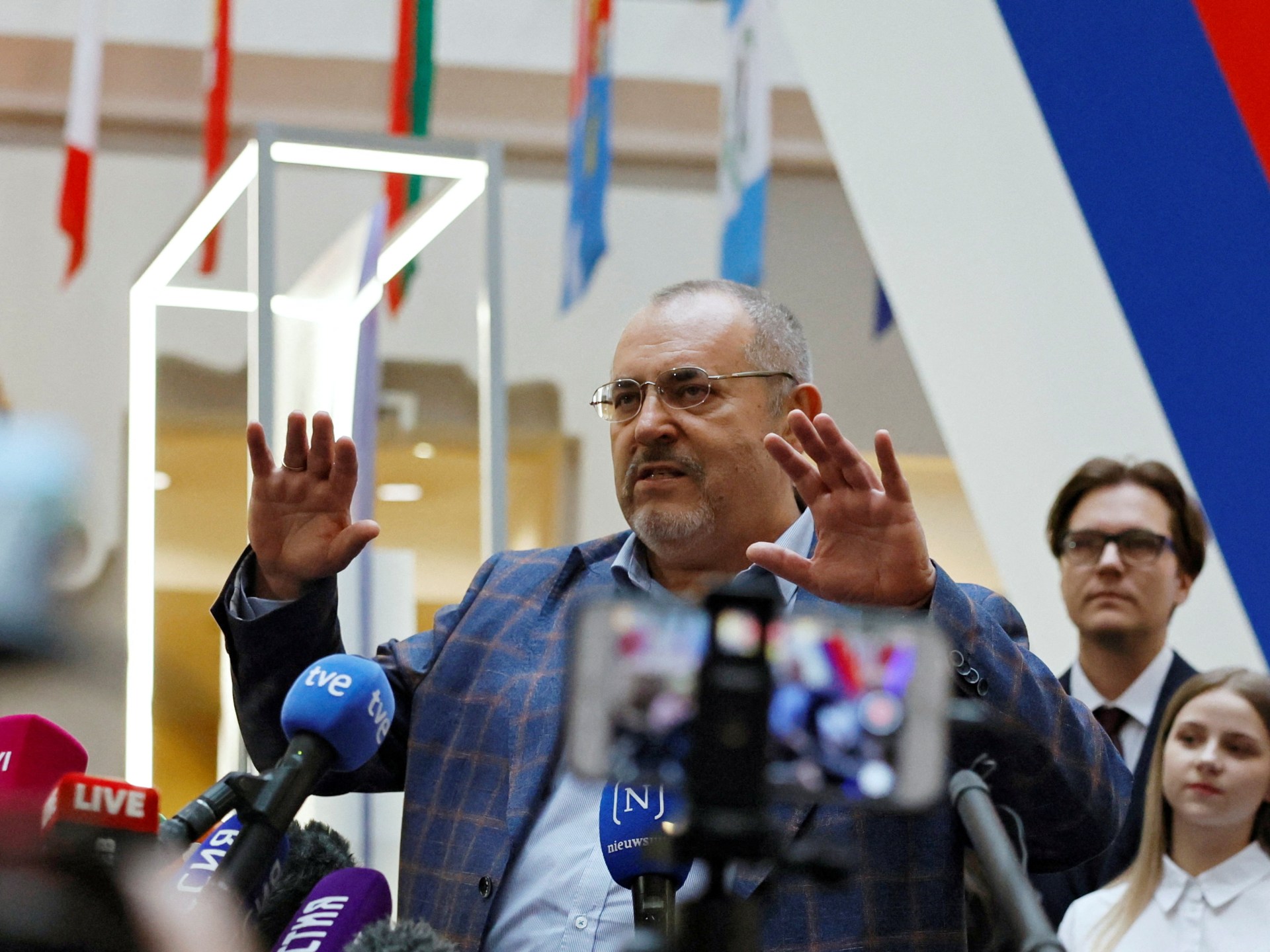
Washington, D.C. – United States officials have increasingly suggested that the Palestinian Authority (PA) should govern over Gaza after Israel achieved its goal of eliminating Hamas, the group that currently controls the territory.
But analysts warn that the proposal may be unrealistic and premature as the war between Israel and Hamas nears the start of its seventh week.
American President Joe Biden and his top aides have repeatedly expressed full support for Israel’s offensive in Gaza, but Washington has nonetheless given hints about what it would like to see after the conflict.
The Biden administration said it does not support an indefinite Israeli military presence in the area and opposes shrinking the besieged strip or permanently displacing its population.
But if Israel succeeds in driving Hamas out of Gaza – a goal that is far from guaranteed – the PA’s return to Gaza would face many hurdles, including Israeli resistance.
Earlier this month, PA President Mahmoud Abbas appeared to make the authority’s return to Gaza conditional on reaching a “political solution” to the conflict, which would include the establishment of a Palestinian state with East Jerusalem as its capital.
“On various levels, this is just a pipe dream,” Osamah Khalil, a history professor at Syracuse University, said of the handover of Gaza to the Palestinian Authority.
Why is the US pushing for this?
Khalil said the Biden administration is facing increasing pressure over its support for Israel because of the atrocities it has been accused of in Gaza. At least 11,500 Palestinians have been killed so far, with United Nations experts Warning of “significant risk of genocide” in the area.
The Biden camp is trying to shift the focus to the end of the conflict by claiming that the Palestinians will have to rule Gaza themselves at some point, Khalil explained.
“It is for the domestic audience because there is an absolute lack of political will in the United States – especially at the start of an election year – to hold Israel accountable,” Khalil told Al Jazeera.
He added that there is “an absolute lack of fresh ideas” in Washington, leading to a policy of “avoiding conflict resolution and focusing on conflict management.”
Both the United States and Israel have ruled out the possibility of a political confrontation with Hamas after the war.
How did we get here?
The PA – which is controlled by the Palestine Liberation Organization (PLO) and its dominant faction, Fatah – was established in 1994 as part of the Oslo Accords, which aimed to hand over the occupied Palestinian territories from Israeli military control to civilian leadership.
Oslo promised an eventual Palestinian state, but the so-called peace process has never led to a solution to the Israeli-Palestinian conflict.
Over the next decade, the Palestinian Authority continued to oversee a limited form of self-rule over the West Bank and Gaza Strip, while coexisting with the Israeli occupation, which had near-total control over security matters in the Palestinian territories.
In 2005, Israel unilaterally withdrew its forces and dismantled its settlements in Gaza, but retained control over movement in and out of the coastal enclave.
A year later, Hamas won the Palestinian parliamentary elections, dealing a major blow to the PA.
Since Hamas was committed to armed struggle against Israel and Fatah was committed to the peace process, the two parties were unable to resolve their differences.
Meanwhile, Hamas faced increasing international pressure and fighting broke out between the group and the Palestinian Authority. Hamas took over Gaza in 2007 and has maintained control of the area ever since. The Palestinian Authority, for its part, remained in the West Bank while Israel continued its settlement expansion there.
The split effectively divided the Palestinian national movement. Repeated attempts to close the gap Reconciliation agreements have failed.
With the peace process frozen, Israel blockaded the Gaza Strip while simultaneously tightening its military occupation of the West Bank with US support, in violation of international law.
What did US officials say?
Assuming that Hamas will be eliminated by the end of the current Israeli offensive, the US now expects the Palestinian Authority to rule Gaza again.
Assistant Secretary of State for Near East Affairs Barbara Leaf told MPs last week that the Palestinian Authority is the “only Palestinian government to emerge from the Oslo Accords”.
“Whatever its shortcomings, it is the government for the Palestinians in the West Bank,” Leaf said. “We believe that ultimately Palestinian voices and aspirations must take center stage Post-conflict governance and security in Gaza.”
She added that “the Palestinian Authority is the appropriate place to look for governance.”
Secretary of State Antony Blinken also indicated that the Palestinian Authority would eventually take over Gaza. He said earlier this month that a lasting peace “must include a Palestinian-led government and the unification of Gaza with the West Bank under the Palestinian Authority.”
Biden and his aides have also talked about reviving the two-state solution to the conflict.
However, Khalil Jahshan, executive director of the Arab Center Washington DC, a think tank, said as long as the US doesn’t call for a ceasefireFor him it was a “waste of time” to talk about what happened after the war.
He added that Palestinians should have a single authority in the West Bank and Gaza – but after a ceasefire and a democratic election.
“But turning a dysfunctional authority in the West Bank into essentially a complete shambles in Gaza is a formula for disaster,” Jahshan told Al Jazeera. Israeli bombing damaged almost half of the residential buildings in the area.
Khalil, the history professor, echoed Jahshan’s comments about the unworkability of the US proposal.
“Israel has no intention of agreeing to a Palestinian state,” Khalil told Al Jazeera. “And in the end, the PA cannot come back on the backs of Israeli tanks and say, ‘We are the new authority.'”
What did Israel say?
Israeli Prime Minister Benjamin Netanyahuwhose right-wing Likud party rejects the creation of a Palestinian state, has all but rejected the claims of its US allies and said Israel would retain security control over Gaza.
“Gaza must be demilitarized and Gaza must be de-radicalized,” he said NBC News last week. “And I think so far we have not seen any Palestinian force, including the Palestinian Authority, capable of doing that.”
Jahshan said it was unlikely that the U.S. would meaningfully pressure Israel toward a more comprehensive solution to the conflict in any case.
“This government has proven that it is incapable to show the political or moral will or diplomatic skills to bring us closer to this idea,” Jahshan told Al Jazeera. “So it preaches it, but only as a defense mechanism for its diplomatic failures in the region. That’s not a realistic option.”
Khalil also pointed out that the US was not serious about resolving the conflict. He said the US would consider the return of the Palestinian Authority to allay internal disagreements over Western support for Israel.
Khalil added that the discussion over future governance also buys the Israelis more time to achieve a previously elusive victory in Gaza.
Khalil noted that after more than 40 days of relentless bombing, Israel is still far from neutralizing Hamas. The Palestinian group continues to target Israeli troops.
Israeli forces have also failed to free prisoners taken during Hamas’ Oct. 7 attack and have not killed any senior political or military leaders of the Palestinian group.
What did the PA say?
Still, 88-year-old President Abbas has expressed willingness to bring the PA back to Gaza, but only as part of a broader solution.
“We will fully assume our responsibilities within the framework of a comprehensive political solution that covers the entire West Bank, including East Jerusalem and the Gaza Strip.” Abbas was quoted as the official Palestinian news agency Wafa told Blinken earlier this month.
But for some analysts, the Palestinian Authority’s shortcomings in the West Bank and its increasingly aging and isolated leadership make it impossible to lead the Palestinian national movement.
Adam Shapiro, the director of Israel-Palestine advocacy at Democracy for the Arab World Now (DAWN), a U.S.-based human rights group, pointed to Israel’s deadly raids and the… Settler violence This happens almost daily across the West Bank, right under the PA’s nose.
“It’s really mind-blowing,” Shapiro said as he suggested the PA as a solution to Gaza. “The question becomes whether these officers think we’re not paying attention or whether they’re just not paying attention.”






Recent Comments